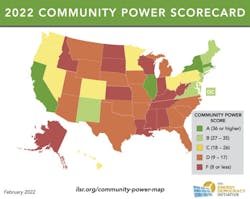Institute for Local Self Reliance: Only handful of U.S. states Head of the Class to foster Microgrid, Clean Energy growth
The energy transition may be gaining momentum as favorite subjects for commercial, industrial and mission critical users, but some states are apparently hurting the learning curve to failing to promote local power resiliency, according to a new report.
Only four states earned A grades in a nationwide report card on openness to local clean energy resources which could facilitate the growth of microgrids. More than half came home with C averages or worse.
The non-profit advocacy group Institute for Local Self-Reliance released its annual Community Power Scoreboard showing how all of the U.S. rank in terms of helping or hindering local clean energy actions.
The rankings take into account statewide and local policies on issues such as net metering, interconnection, fees and building energy efficiency codes, among other factors. The findings are based on data from the American Council for an Energy-Efficient Economy, the National Renewable Energy Laboratory, Vote Solar and others.
Illinois, California, New York and Massachusetts led the way with A grades by the ILSR. All of these states are embracing solar and storage combinations which, along with back-up on-site gen-sets, can deliver microgrids to bolster energy resiliency and sustainability.
In Chicago, local utility ComEd is putting the long-in-the-works Bronzeville Microgrid into operation, connecting several mission-critical facilities such as higher education, public safety and local services. The cluster of several microgrids – which include rooftop solar, energy storage and backup power-- is geared to provide energy even if the main grid goes down.
See our coverage of Clean Energy and Microgrid growth in Massachusetts
…California Utility Regulators approve plan for Community Microgrids
And New York: Tecogen Microgrids, Cogeneration units planned by NYC Hotel
Subscribe to EnergyTech’s free newsletter for more Insights into the C&I Energy Transition
Solar and wind power-friendly states such as New Mexico, Virginia, Maine and New Jersey merited B-level ratings from the ILSR. New Mexico launched its community solar program and Delaware legislators passed a bill to improve the state’s community solar program.
“Many cities have ambitious climate or community resilience goals, but their path forward is limited by state policy,” Maria McCoy, ILSR research associate and lead author on the Community Power Scorecard report, said in a statement. “When states remove barriers and provide innovative policy options, communities can make decisions that maximize local benefits in the transition to clean energy.”
Some of the grading may be considered surprising. Washington, Oregon, Colorado and Minnesota, all regarded as having some progressive clean energy policy making, were given Cs or “average” in the Community Power Scoreboard.
Texas, Oklahoma, Wyoming and the east coast from Florida to North Carolina were given Ds. Texas, however, ranks far above any other state in wind power capacity, but its policies are considered as headwinds to community-level clean energy movements.
Kansas, Louisiana, Mississippi, North and South Dakota, Alabama, Tennessee and Kentucky were among states flunking the ILSR test.
See the full Institute for Local Self Reliance report
----
(Rod Walton, senior editor for EnergyTech, is a 14-year veteran of covering the energy industry both as a newspaper and trade journalist. He can reached at [email protected]).
About the Author
Rod Walton, EnergyTech Managing Editor
Managing Editor
For EnergyTech editorial inquiries, please contact Managing Editor Rod Walton at [email protected].
Rod Walton has spent 17 years covering the energy industry as a newspaper and trade journalist. He formerly was energy writer and business editor at the Tulsa World. Later, he spent six years covering the electricity power sector for Pennwell and Clarion Events. He joined Endeavor and EnergyTech in November 2021.
Walton earned his Bachelors degree in journalism from the University of Oklahoma. His career stops include the Moore American, Bartlesville Examiner-Enterprise, Wagoner Tribune and Tulsa World.
EnergyTech is focused on the mission critical and large-scale energy users and their sustainability and resiliency goals. These include the commercial and industrial sectors, as well as the military, universities, data centers and microgrids. The C&I sectors together account for close to 30 percent of greenhouse gas emissions in the U.S.
He was named Managing Editor for Microgrid Knowledge and EnergyTech starting July 1, 2023
Many large-scale energy users such as Fortune 500 companies, and mission-critical users such as military bases, universities, healthcare facilities, public safety and data centers, shifting their energy priorities to reach net-zero carbon goals within the coming decades. These include plans for renewable energy power purchase agreements, but also on-site resiliency projects such as microgrids, combined heat and power, rooftop solar, energy storage, digitalization and building efficiency upgrades.

